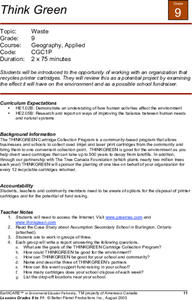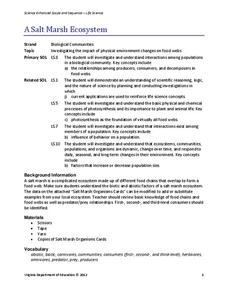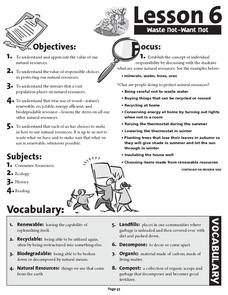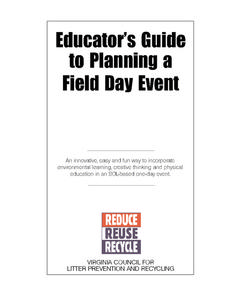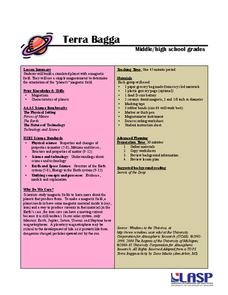Cal Recycle
Conserving Natural Resources
Trying to plan an engaging elementary science unit on natural resources? Conserve your energy! This five-part series of lessons and hands-on activities has exactly what you need to teach young scholars about the importance of conservation.
Curated OER
Recycled Paper
Sixth graders keep track of the amount of paper they consume on a daily, weekly, and monthly basis. The goal of the lesson is to have them all find ways to reduce the amount they use. Everyone creates recycled paper from old newspapers...
PricewaterhouseCoopers
Waste and Recycling: Recycling and Energy Recovery
Reduce, reuse, recycle, and recover. Young environmentalists learn about the overwhelming amount of garbage produced and discover better ways to minimize their impact on Earth by learning the difference between garbage and recyclables.
NASA
Transportation and Space: Reuse and Recycle
What can I use in space? The three-lesson unit has groups research what man-made or natural resources would be available during space exploration or habitation. Team members think of ways that resources can be reclaimed or reused in...
Virginia Department of Education
Owl Family Natural Selection
How do genetic mutations within a population lead to future variations? Provide your class with the resources to answer this question and more upon completing an activity on natural selection. The entire class participates in a fun role...
WE Charity
High School–Module 2: Circular Economy and Nature
Everyone's heard the popular slogan reduce, reuse, recycle, but there may be a better way to talk about sustainability. Using the second lesson from the five-part WE Are Innovators—High School Modules series, learners explore issues...
Virginia Department of Education
Go with the Flow
How does nature's hierarchy relate to our local human environment? Answer this question, along with others, as the class visually depicts the natural hierarchy provided by nature. Pupils discuss each piece of the pyramid and its energy...
K-State Research and Extensions
Water
How are maps like fish? They both have scales. The chapter includes six different activities at three different levels. Scholars complete activities using natural resources, learn how to read a map, see how to make a compass rosette,...
Core Knowledge Foundation
Taking Care of the Earth Tell It Again!™ Read-Aloud Anthology
A read-aloud anthology closely examines human impact on the Earth while boosting reading comprehension skills. Through stories, scholars examine the concepts of natural resources, pollution, garbage, and recycling and brainstorm ways to...
Captain Planet Foundation
Rotting Away
What happens at the end of a plant's life cycle? Show kids the natural way that plants show that they're decomposing, as well as the importance of compost, with a lesson about living organisms. After reading Log Cabin by Anne Schreiber,...
Curated OER
Think Green
THINKGREEN has a computer printer cartridge collection program. After reading the story of how Assumption Secondary School in Burlington, Ontario started participating in the THINKGREEN recycling program, pupils work in groups of three...
Virginia Department of Education
A Salt Marsh Ecosystem
What a web we weave. Pupils use yarn as the primary resource to create a web depicting the intricacies of a salt marsh ecosystem. They participate in a question and answer session, which leads to an in-depth facilitated discussion about...
Forest Foundation
Waste Not - Want Not
Recycling is the focus in the sixth of a nine-activity series devoted to forest ecosystems. Class members read an article about the responsible use of natural resources and ways to reduce land fill.
Minnesota Department of Natural Resoures
Tree Life
The life of a tree is the focus of a packet consisting of several activities all covering a different subject. Second graders measure shadows, make pinecone critters, write poems, count rings, complete a word search, play tree tag, and...
United Nations
Compost Monitor Training
What should go in the trash, and what can be composted? Guide your young conservationists through the process of composing their trash with a lesson about the different ways we can dispose of garbage. Using a trash bag with clean...
Virginia Department of Education
Educator’s Guide to Planning a Field Day Event
Plan an environmentally friendly field day for your young conservationists with this collection of activities and resources. Whether it's bowling with plastic bags full of crumpled up newspaper and empty plastic bottles, or having relay...
National Energy Education Development Project
Great Energy Debate
If someone yelled for eight years and eight months, they could produce enough energy to heat one cup of coffee. A lesson on energy encourages scholars to research 10 different energy sources in groups before playing a game. Twenty...
Virginia Department of Education
Predator-Prey Simulation
Do your pupils have the misconception that environmental predators are "bad" and harm smaller creatures? The simulation explains, in detail, the important role predators play in maintaining a stable ecosystem. Through web-based research,...
Curated OER
Real-World Projects: Challenges from the Polymer Industry
Two scenarios are presented for chemistry detectives to decipher. Both require the use of an infrared spectrometer and focus on the examination of polymer materials. In the first, lumps in polyethylene bottles are analyzed. In the...
Mary Pope Osborne, Classroom Adventures Program
Mummies in the Morning Egyptian pyramids, hieroglyphics
Visit the Magic Treehouse and take your class on a trip through time with a reading of the children's book Mummies in the Morning. Using the story to spark an investigation into Egyptian culture, this literature unit engages...
Polar Trec
What Is My Footprint?
How do one's habits and lifestyle choices affect the environment? Through a short online survey, learners will calculate their own carbon footprints then determine how to reduce their impact on the environment through simple steps, such...
Houghton Mifflin Harcourt
That’s Amazing!: Challenge Activities (Theme 3)
Synonym dominoes, anyone? As part of the activities designed for kids who have mastered the basic concepts in the Houghton Mifflin Harcourt thematic unit That's Amazing! kids are offered a variety of activities that include developing a...
Seussville
The Lorax's Earth Day
Add a touch of Dr. Seuss whimsy to your Earth Day celebration with six pages consisting of Earth-friendly, inspiring, and engaging activities designed to enhance the beauty of your school campus and showcase the famous story, The Lorax.
University of Colorado
Terra Bagga
One way to identify possible volcanic activity on other planets is by testing the planet for magnetism. A science lesson begins with pupils constructing their own planet from a dead battery, magnets, paper, and tape before labeling the...












